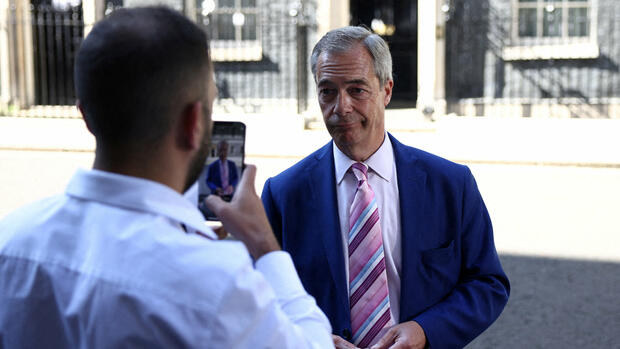The private bank Coutts does not want to comment on the reasons for the account closure.
(Photo: Reuters)
London Politically, Nigel Farage no longer plays a role in Great Britain. Nevertheless, the former Brexit champion managed to cast a spell over parliament, government and the financial district in the City of London. The focus is on the controversial question of whether and when banks can close the accounts of unwanted customers for reasons of reputation and when they restrict freedom of expression.
The private bank Coutts, which only serves millionaires and members of the royal family, recently terminated the bank account of the 59-year-old ex-politician. Farage was angry and suspected that the bankers wanted to get rid of him for political reasons. Initially, however, the British media reported that the assets of the political right wing had fallen below the million mark – it was a purely business decision.
Now, however, Farage has produced internal bank documents backing his suspicions: a submission to the Natwest subsidiary’s reputation committee classified him as a “disingenuous fraudster” with “xenophobic, chauvinistic and racist views.”
His stance on Brexit, alleged connections to Russia and his friendship with former US President Donald Trump are cited as evidence. “The committee considered that continuing the banking business (of Nigel Farage) with Coutts was inconsistent given his publicly expressed views, which are at odds with our position as an inclusive organisation,” the report reads.
Coutts declined to comment on the reasons for the account termination for privacy reasons, but said it would take into account “a number of factors, including economic viability, reputational considerations, and legal and regulatory requirements.”
Criticism of the bankers’ decision
The Conservative press and many Tory MPs now see freedom of expression in the UK at risk. Prime Minister Rishi Sunak was also critical of the bankers’ decision: “That’s wrong. No one should be barred from using essential services because of their political views. Freedom of expression is the cornerstone of our democracy.”
>> Read here: Inflation in the UK falls more than expected
His right-wing party friend Suella Braverman even sees the so-called “woke capitalism” at work: “The Coutts scandal exposes the sinister nature of much of the diversity, equality and inclusion industry,” the Home Secretary tweeted. The daily newspaper “The Telegraph” claims to have learned that the government intends to revoke the license of those banks that disadvantage customers with unfavorable opinions.
It has long been common practice for banks to scrutinize so-called “politically exposed persons” more than other customers, also in order to meet the strict anti-money laundering requirements of the financial regulator. In addition, banks have the right to part with customers if they see their reputation endangered by the business relationship.
However, FCA chief Nikhil Rathi has just warned that customers should not be discriminated against because of their political views and should be treated “fairly”. One is in talks with Natwest, Rathi told a parliamentary committee.
Farage, on the other hand, is demanding that a parliamentary committee of inquiry investigate the affair. In any case, for the populists it is a good start to resume their campaign against the political and economic establishment.
More: How the government and opposition in London are struggling with their goals
